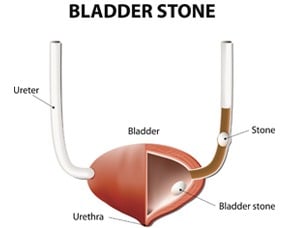Let’s face it – most of us have heard of kidney stones or maybe have even experienced them, but bladder stones? Yes, stones can form in the bladder. They are much more common in men past the age of 50 but are much less common than kidney stones.
If they are small enough they may cause no symptoms passing on out the body on their own without a person even knowing they had any. But, unfortunately, more often than not, they will make their appearance known causing pain or other problems on urination.
Bladder stones are hard masses of minerals in your bladder. The bladder’s job is to collect urine that comes down from the kidneys. As the bladder fill up throughout the day, you will get the urge to empty its contents.
Generally, the bladder will be completely emptied but there can be certain health issues preventing that from happening. Any urine left in the bladder after urination can develop stones from minerals that crystallize in the concentrated urine.
The signs or symptoms of bladder stones can vary from severe abdominal pain to blood in the urine. Sometimes there may be no signs of them whatsoever as small bladder stones can pass unnoticed without treatment.
However, if a stone is irritating the walls of the bladder or is blocking the flow of urine, the symptoms can include:
·Lower abdominal pain
·In men, pain or discomfort in the penis or testicles
·Burning sensation when urinating
·Frequent urination
·Difficulty urinating or an interruption of the urine flow
·Blood in the urine
Causes Of Bladder Stones
The primary cause of bladder stones is not completely emptying the bladder of urine. This is when urine will form crystals. Other causes can be some infections or an underlying condition affecting the bladder’s ability to hold, store, or eliminate urine.
Prostate Gland Enlargement In Men or Benign Prostatic Hyperplasia (BPH) is a common cause of bladder stones in men. When the prostate is enlarged this can obstruct the flow of urine preventing a complete elimination or emptying of the bladder.
Diagnosis of Bladder Stones
To diagnosis bladder stones, the following procedures may be done:
·A physical exam
·Urinalysis – a urine sample will be taken to examine for microscopic amounts of blood, bacteria, and crystallized minerals. This can also help determine if a urinary tract infection is the cause of the bladder stones.
·CT of the bladder
·Ultrasound to detect bladder stones
·X-ray of the kidneys, bladder and ureters
Treatment And Prevention Of Bladder Stones
Most likely bladder stones will need to be removed which can be done with a procedure called a cystolitholapaxy. This procedure will help break up stones into pieces small enough to pass in the urine. If a stone is too large or hard to break up, then they can be removed surgically.


